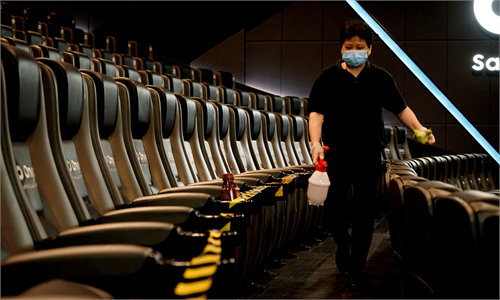Shanghai speeds up economic recovery with 179 key projects launched in June
A total of 179 key projects kicked off, electricity intensity rebounds

A combination of photos shows the empty Bund in Shanghai with no traffic on April 1, 2022 (left) in comparison with the vibrant movements of cars and people that returned on June 1. Photo: IC
Shanghai has pressed the accelerator button on its economic revival as a number of economic indicators, including project construction, foreign investment and electricity consumption, all point to a sharp rebound over the past one month after the city lifted strict anti-epidemic restriction on June 1.
Experts expect Shanghai's economic momentum will lead to a strong rebound in China's economic growth during the third quarter.
Hua Yuan, deputy secretary general of Shanghai Municipal Government and head of Shanghai Municipal Development and Reform Commission, said on Friday that Shanghai's resumption of work and production has maintained strong momentum and is meeting expectations as some indicators are moving in a positive direction.
A nucleic acid industrial park, the first of its kind in Shanghai will begin construction in Fengxian district in mid-July, Shanghai Securities News reported. The park will cover an area of three square kilometers, including a pilot zone for nucleic acid related products.
The latest statistics show that since mid-June, 179 key projects in Shanghai entered construction, with a total investment of more than 370 billion yuan ($55.27 billion), covering urban infrastructure, science and technology industry, social welfare and urban safety, according to the Shanghai Municipal Development and Reform Commission.
The city's electricity usage for large public buildings recovered to its usual level by the end of June, up 65 percent from the first week June, according to data from Shanghai Municipal Commission of Housing and Urban-Rural Development.
In the first week of July, the average daily cargo flights and cargo throughput at Shanghai Pudong International Airport has picked up and returned to normal level, according to the Shanghai Airport Group.
The economic readings showed that Shanghai's competitiveness has not changed because of the short-term impact of the epidemic, Hu Qimu, chief research fellow at the Sinosteel Economic Research Institute, told the Global Times on Sunday.
The openness of Shanghai's economic structure, the level of high-end R&D and talent attraction, as well as the radiation and driving effect of its manufacturing industry on the surrounding area remain significant, Hu said.
US electric car marker Tesla told the Global Times that despite the severe challenges posed by the epidemic, its Shanghai factory's monthly sales performance have exceeded pre-epidemic levels since the resumption of work, which once again demonstrated the strong resilience of the Chinese economy.
Tesla's domestic deliveries hit a record high of 77,938 vehicles in June, up 177 percent year on year. In the first half of 2022, Tesla's Shanghai factory produced a total of nearly 300,000 cars, accounting for more than 60 percent of the annual delivery volume in 2021, of which nearly 100,000 were delivered overseas.
In a recent development, over 260 enterprises of the world's top 500 enterprises have signed up for the 5th China International Import Expo (CIIE) to be held in Shanghai from November 5th to 10th as scheduled, according to Hua.
"At present, the signing rate has exceeded 80 percent of the exhibition floor, reflecting strong confidence of foreign investment in Shanghai and the Chinese market," Hua said.
In mid-June, Shanghai added 30 regional headquarter as well as 10 R&D centers belonging to foreign invested enterprises, Hua added.
The gradual release of macro and micro data in June shows the strong resilience of Shanghai's economy, with some sectors recovering faster than expected, Chen Jia, a research fellow at the International Monetary Institute of the Renmin University of China, told the Global Times on Sunday.
Shanghai has recently reopened its local cultural and tourism industry, catering sector, as well as cinemas, with a strong rebound in consumer spending expected, Chen said.
Services sector, a weak link in the resumption of work and production, had recorded a quick rebound.
For example, more than 60 stores Naixue Tea, a leading Chinese tea brand, resumed in-house service in Shanghai, with sales in the first week of July up nearly 180 percent from that in June, the Shanghai Securities News reported.
More than 47 percent of cinemas in Shanghai reopened on Friday with a box office of 2.62 million yuan, according to film data tracking platform Dengta.
As the country's main economic center, Shanghai plays a huge role in driving the development of surrounding areas. The economic recovery of Shanghai will put the recovery of the whole East China region and the country on a fast track, Hu said.
China's average daily volume of express delivery services recovered to more than 300 million in June, exceeding the level of the same period last year, the State Post Bureau said on Thursday.
The growth in express delivery reflected a demand rebound in terminal markets while the inflow of foreign capital showed investors are betting on China's bottoming as the severity of the virus is eased, Hu said.
"All these indicators have pointed to a strong rebound in China's economic recovery in the third quarter," Hu said
If there is no major repeat outbreak, China's GDP growth is expected to rebound faster than expected in the second half of the year, Chen said.
Though Shanghai has identified sporadic covid-19 cases increase in recent days with five new infections and 52 silent carriers reported on Saturday, experts believed it not have a major impact on the city's economic recovery.
"Since the last round of epidemic, Shanghai has gained a lot of experience in epidemic prevention and in dealing with local sporadic epidemic," Hu said.


